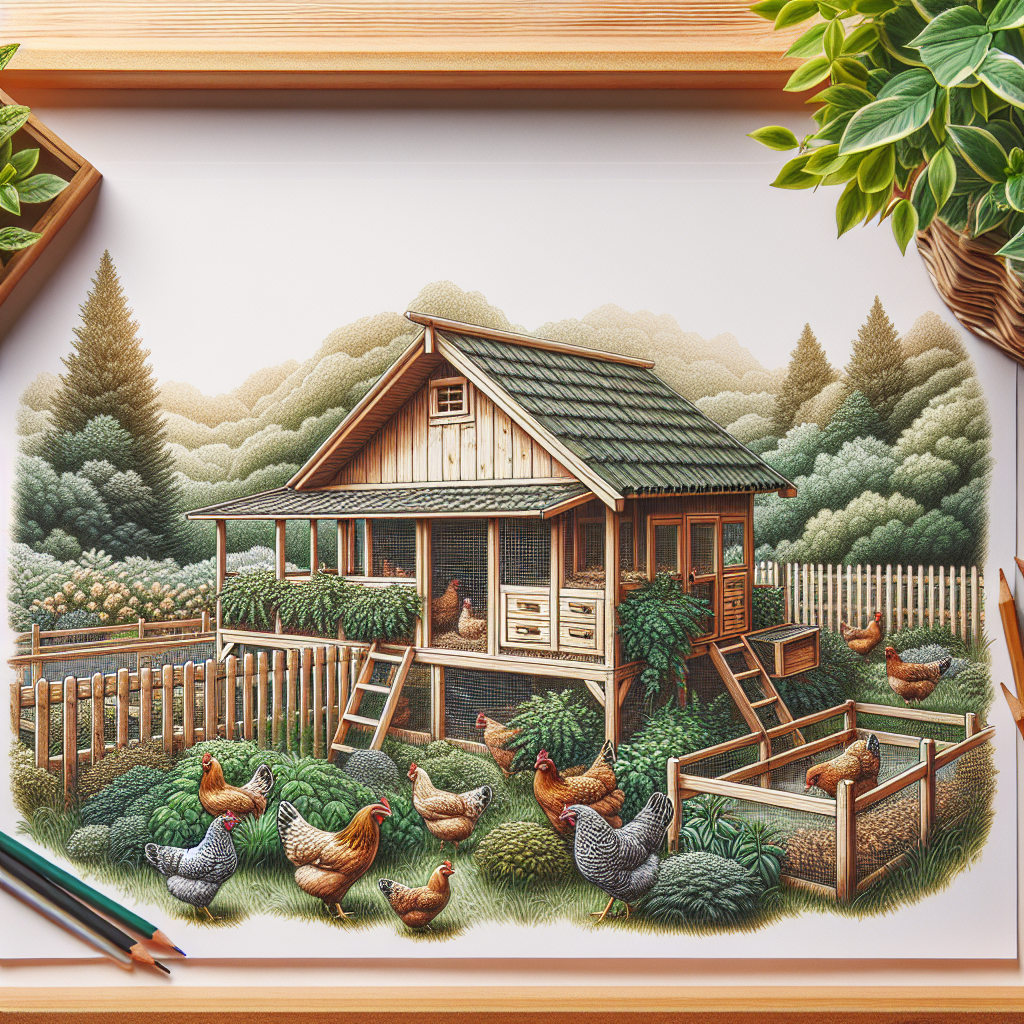As a chicken owner, you want to ensure the health and wellbeing of your flock all year round. But have you ever wondered if there are specific seasonal preventive measures that can be taken to further protect your feathered friends? In this article, we will explore the topic of seasonal chicken care and discuss the importance of implementing appropriate measures to keep your chickens happy and healthy throughout the changing seasons. Whether it’s protecting against extreme heat in the summer or warding off common winter ailments, we will provide you with the information you need to give your chickens the best possible care no matter the time of year. So, sit back, relax, and let’s dive into the world of seasonal preventive measures for chicken health and wellbeing.
Spring
Feeding and Nutrition
In spring, it is important to pay extra attention to the feeding and nutrition of your chickens. As they transition from winter to the warmer season, their dietary needs may change. Spring is a time of increased activity for chickens, as they start to forage for more insects and greens in their environment. You can support their nutritional needs by providing a balanced feed that is rich in protein and vitamins. Additionally, consider supplementing their diet with fresh fruits and vegetables. This will not only enhance their nutrition but also provide them with a variety of flavors and textures to keep them interested in their food.
Parasite Control
With the arrival of spring, parasites such as mites, lice, and worms become more active. These parasites can pose a threat to the health and wellbeing of your chickens. Implement a regular parasite control program to prevent infestations and protect your flock. This may involve regularly inspecting your chickens for any signs of infestation, treating affected birds with appropriate medications, and regularly cleaning and disinfecting their living areas. Additionally, consider introducing natural predator insects, such as beneficial nematodes, to help control parasites in a sustainable and environmentally friendly way.
Vaccinations
Spring is a good time to review your flock’s vaccination schedule and ensure that all necessary vaccines are up to date. Vaccinations are crucial for protecting your chickens against common and potentially deadly diseases such as Newcastle disease, infectious bronchitis, and Marek’s disease. Consult with a veterinarian or poultry specialist to determine the appropriate vaccines for your specific flock and follow their recommended vaccination schedule. By vaccinating your chickens, you can significantly reduce the risk of disease outbreaks and keep your flock healthy and thriving.
Molting
The spring season often brings about molting in chickens. Molting is a natural process in which chickens lose and regrow their feathers. It is important to provide your chickens with appropriate care during this time to support their molting process. Ensure that their diet is rich in protein, as this nutrient is essential for feather growth. Consider adding supplementary protein sources, such as dried mealworms or black soldier fly larvae, to their feed. Providing your chickens with ample access to clean and fresh water is also crucial during molting, as it helps with feather regrowth. Finally, create a stress-free environment by minimizing disturbances and providing adequate shelter, as molting can render chickens more susceptible to stress and illness.
Biosecurity
As your chickens enjoy the newfound freedom of venturing outdoors in spring, it is essential to prioritize biosecurity measures to protect them from potential diseases and pathogens. Implementing biosecurity practices can help prevent the introduction and spread of diseases within your flock. This includes maintaining a clean and sanitary living environment, practicing good hygiene when handling chickens, and limiting visitors to the flock. Regularly clean and disinfect equipment, such as feeders and waterers, and use footbaths or dedicated footwear when entering the chicken area. By following these biosecurity measures, you can minimize the risk of disease transmission and safeguard the health and wellbeing of your chickens.
Summer
Heat Stress Prevention
As temperatures rise during the summer months, chickens are at risk of heat stress, which can be detrimental to their health and well-being. To prevent heat stress, provide your flock with ample shade and access to cool, fresh water at all times. Consider placing shade cloths or umbrellas in their outdoor areas to create shaded spots. You can also provide misters or sprinklers to help cool down the environment. Avoid handling or working with your chickens during the hottest parts of the day to minimize their stress levels. Monitoring their behavior and physical signs of distress, such as panting and wings held away from their body, is also vital in identifying and addressing heat stress promptly.
Pest Control
Summer is a time when pests such as flies, mosquitoes, and external parasites thrive. These pests can irritate your chickens and transmit diseases. Implementing effective pest control measures is essential to keep your flock comfortable and healthy. Regularly clean and remove any wet or decaying organic matter, as it attracts flies and other pests. Use fly traps and natural pest control methods, such as companion planting and predator insects, to help reduce pest populations in the chicken area. Additionally, consider applying suitable treatments or repellents, following the manufacturer’s instructions, to protect your chickens from pests such as mites and mosquitoes.
Dust Bathing Area Maintenance
Chickens love dust bathing as a way to keep themselves clean and rid their feathers of parasites. During summer, ensure that their dust bathing areas are well-maintained and easily accessible. Provide them with fine sand or soil in a designated area, and regularly replenish it to encourage their natural dust bathing behavior. Keep the area dry and free from excessive vegetation to reduce the risk of parasites. Regularly inspect the dust bathing area and remove any debris or soiled material. By providing a clean and suitable dust bathing area, you are helping to promote good hygiene and prevent parasite infestations in your flock.
Water Management
Proper water management is crucial during the summer season to ensure your chickens stay hydrated and healthy. Chickens have an increased need for water in hot weather, as they can quickly become dehydrated. Make sure to provide them with an ample supply of fresh and clean water. Consider using larger waterers or installing automatic waterers if you have a larger flock to ensure an uninterrupted water supply. Regularly check and clean the waterers to prevent algae growth or contamination. Additionally, placing waterers in shaded areas can help keep the water cool and encourage chickens to drink more.
Predator Prevention
Summer can bring an increased threat of predators, as they become more active in search of food. Protecting your chickens from predators is crucial for their safety and wellbeing. Ensure that their coop and outdoor areas are secure and predator-proof. Regularly inspect fences and enclosures for any potential weak spots and repair them promptly. Consider using deterrents such as motion-activated lights or alarms to deter predators from approaching the chicken area. It is also advisable to supervise your chickens when they are free-ranging and bring them indoors at night to reduce the risk of predator attacks.
Autumn
Molting
Just like in spring, autumn is another season when chickens may go through molting. During molting, their old feathers are replaced with new ones, and they may require some additional care. Provide a diet that is rich in protein to support feather regrowth. Consider adding protein-rich treats such as mealworms or soy meal to their feed. Ensure a clean and comfortable environment, as molting chickens may be more sensitive to cold weather. Regularly assess their overall health and address any signs of stress or illness promptly.
Feather Health
In autumn, pay special attention to your chickens’ feather health. The quality of their feathers plays a crucial role in insulating them against the cooler temperatures. Regularly inspect your chickens for signs of feather damage, such as broken or missing feathers. Implement a gentle grooming routine to remove any clumped or dirty feathers that could compromise their insulating abilities. Provide your flock with sufficient access to dust bathing areas, as this helps keep their feathers clean and free from parasites. Consider supplementing their diet with omega-3 rich foods, such as flaxseed or fish oil, to promote healthy feather growth.
Pest Control
Autumn can bring about a resurgence of pests, with cooler temperatures favoring their activity. Implement a pest control program to prevent infestations and protect your flock. Regularly inspect your chickens for signs of external parasites such as mites and lice. Treat affected birds promptly with appropriate medications, and consider using natural predator insects to control pest populations. Ensure that their living areas are clean and dry, as this discourages pests from establishing themselves. By staying proactive in pest control, you can help keep your chickens comfortable and disease-free.
Vitamin and Mineral Supplements
As the seasons change and the availability of fresh forage diminishes, consider supplementing your chickens’ diet with vitamin and mineral supplements. These supplements help bridge any nutritional gaps and support their overall health. Consult with a veterinarian or poultry specialist to determine the appropriate supplements for your flock. Ensure that any supplements are provided in the correct dosage and are suitable for chickens. Following the recommended guidelines will help ensure that your chickens receive the necessary vitamins and minerals to thrive during the autumn season.
Preparing for Winter
Autumn is also the time to prepare your chickens for the upcoming winter season. Take steps to ensure that their living environment is well-insulated and protected from harsh weather conditions. Inspect their coop for any potential drafts or areas that may need sealing. Consider adding insulation to the walls or adding extra bedding to provide additional warmth. Ensure that their access to food and water is not compromised by freezing temperatures or snowfall. Stock up on essential supplies such as feed, bedding, and any necessary medications to have on hand for the winter months. By preparing in advance, you can help your chickens stay comfortable and healthy throughout the colder season.
Winter
Cold Weather Protection
During winter, it is crucial to provide your chickens with adequate protection from the cold weather. Chickens are generally hardy animals, but extreme cold can pose a risk to their health. Ensure that their coop is well-insulated, free from drafts, and dry. Consider adding extra bedding and providing additional sources of heat, such as heat lamps or heated perches, to keep them warm. Monitor their behavior and physical condition regularly for signs of cold stress, such as lethargy or frostbite, and take appropriate measures to ensure their wellbeing.
Ventilation and Air Quality
While it is important to protect your chickens from the cold, it is equally essential to maintain good ventilation and air quality in their coop during winter. Proper ventilation helps remove moisture and ammonia buildup, which can cause respiratory issues. Ensure that the coop has adequate ventilation openings or vents that can be adjusted to control the airflow. Regularly check and clean the ventilation openings to prevent any blockages. However, be mindful not to create drafts that could chill your chickens. Balancing ventilation and temperature control is essential to maintain a healthy living environment for your flock.
Feeder and Waterer Maintenance
During winter, it is crucial to regularly inspect and clean your chickens’ feeders and waterers. Freezing temperatures can cause waterers to freeze, limiting your chickens’ access to water. Use heated waterers or consider replacing their water frequently to ensure a constant supply of liquid water. Inspect feeders daily for any signs of contamination or spoilage. Remove any wet or moldy feed promptly to prevent health issues. Keeping their feeders and waterers clean and functional is vital for their overall health and wellbeing.
Disease Prevention
Winter can be a challenging time for chickens, as diseases can spread more easily in close quarters. Implement strict disease prevention measures to minimize the risk of infections within your flock. Limit exposure to other poultry or wild birds, as they can introduce diseases. Quarantine any new chickens or birds before introducing them to your existing flock. Maintain strict biosecurity practices, including regular cleaning and disinfection of the coop and equipment. Monitor your chickens closely for any signs of illness, such as changes in appetite, lethargy, or respiratory symptoms, and seek veterinary advice if needed.
Flock Enrichment
Winter can be a challenging and dull time for chickens, as they may have limited access to outdoor activities. Providing flock enrichment during this season is crucial for keeping them mentally stimulated and reducing stress. Consider providing toys, such as hanging treats or puzzle feeders, to keep them engaged. Provide perches and roosting areas at different heights to encourage natural behaviors. Consider providing additional sources of entertainment, such as mirrors or hanging vegetation. With proper flock enrichment, you can help alleviate boredom and promote a more fulfilling winter experience for your chickens.
Conclusion
Review and Adaptation
Throughout the year, it is essential to review and adapt your chicken care practices according to the changing seasons. Each season brings unique challenges and considerations for the health and wellbeing of your flock. Regularly assess the effectiveness of your husbandry practices and make necessary adjustments to optimize the care you provide for your chickens. Stay informed about current research, advancements in poultry health, and local regulations to ensure that you are providing the best possible care for your flock.
Continuous Observation and Care
Above all, continuous observation and care are key to maintaining the health and wellbeing of your chickens throughout the seasons. Regularly monitor your flock for any changes in behavior, appearance, or overall condition. Healthy chickens are active, alert, and have glossy feathers. Promptly address any signs of illness or distress and seek veterinary assistance when needed. Remain attentive to the specific needs and requirements of your individual chickens and provide them with the care and attention they deserve. By being vigilant and responsive, you can ensure that your chickens thrive in every season.




